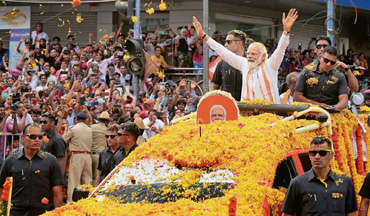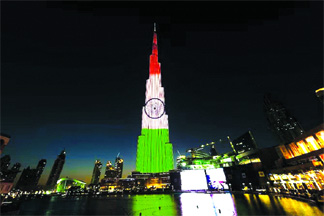
Loss of legitimacy due to corruption taint proved to be the BJP’s undoing in Karnataka
Modi had won in 2019 on a pro-incumbency platform, which is getting frayed at the edges. Pomp and pageantry cannot replace political credibility. He has about 10 months to reclaim his legitimacy.
“But the Karnataka election proved that India is a functioning democracy that does not brook depravity in public life. PM Modi or the BJP cannot make Hindus vote in a particular manner when the ground situation does not merit so. Communal polarization or the politics of hatred for the “other” cannot override the people’s contempt for a candidate. And this local sentiment got reinforced with anti-incumbency against the Centre, which faces allegations of crony capitalism over Adani’s relationship with the Modi government following the release of US short-seller Hindenburg’s report. Probably more damaging than the Adani allegation are the tearful complaints made by India’s star athletes against one of the worst examples of goons in politics.”

Anti- Incumbency is a loss of legitimacy — the cornerstone of all democratic enterprises. No amount of electoral engineering, caste and communal polarization, or media manipulation can reverse the process of loss of legitimacy. That remains the strength of a truly democratic exercise, which manifests the people’s will; and that was on grand display in Karnataka late last week. The people perceived the Karnataka government as corrupt; a government that demands an inconceivable amount of bribe — a cut of 40 per cent from all government contracts. This perception was not created by Opposition propaganda but was conveyed to the people by the Karnataka State Contractors’ Association in a letter to the Prime Minister. Modi had won the 2019 Lok Sabha polls on a pro-incumbency platform, which is getting frayed at the edges.
This is not to wish away caste and communal considerations, but to underscore the utter disgust the voters have for a rapacious government. When two parties put up candidates from the same community or caste, the choice is easier: why vote for a tainted person who represents a corrupt entity? It is a matter of immense reassurance that the small man/woman prevailed over crooked godmen and families that claim to represent a whole community. Any objective observer of politics ought to exult in the result as the Karnataka poll was a fine contest of people’s patience against political greed.
Then, this was not just the reflection of state-level anti-incumbency against the Basavaraj Bommai government, but also a vote against the Central government led by PM Narendra Modi. For, he had promised, “na khaoonga, na khane doonga (neither will I make money nor will I let others do it)” and the Karnataka situation was a breach of this promise. The entire BJP party edifice in Karnataka was complicit and the central leadership either winked at it or remained captive to the caste calculus. There are those who believed that even Bommai could have fared better had he got a freer hand. However, the BJP’s central leadership seems to have a strange belief in the supernatural powers of polarization. In fact, it tends to have bought into its Western detractors’ accusations of India being an elected autocracy or an ethnic democracy.
But the Karnataka election proved that India is a functioning democracy that does not brook depravity in public life. PM Modi or the BJP cannot make Hindus vote in a particular manner when the ground situation does not merit so. Communal polarization or the politics of hatred for the “other” cannot override the people’s contempt for a candidate. And this local sentiment got reinforced with anti-incumbency against the Centre, which faces allegations of crony capitalism over Adani’s relationship with the Modi government following the release of US short-seller Hindenburg’s report. Probably more damaging than the Adani allegation are the tearful complaints made by India’s star athletes against one of the worst examples of goons in politics.
Brij Bhushan Sharan Singh had spent time in jail in a case under TADA — Terrorist and Disruptive Activities (Prevention) Act — over charges of aiding India’s most-wanted criminal Dawood Ibrahim. What is this sort of a man doing in Parliament as a BJP member? Why is he heading the Wrestling Federation of India? Why are the police not arresting him and taking him into custody despite victims narrating instances of sexual harassment? If the BJP thinks that these questions did not exercise the minds of Karnataka voters, the party is living in a fool’s paradise. It is indeed a national issue and will continue to haunt the national conscience in every nook and corner of the country and not just the Jat land of Haryana or western UP. The question of Indian heroes’ izzat or honor cannot be reduced to the caste or political ambitions of the accusing wrestlers.
Then, the proposed ban on Bajrang Dal, promised by the Congress to consolidate Muslim votes, worked well for itself, with the BJP failing to link up Bajrang Dal with Bajrang Bali or Hanuman, one of the most important deities in the Hindu pantheon. The reason, in hindsight, is simple: goons calling themselves Bajrang Dal activists or by other similar-sounding names have been attacking farmers who want to sell cattle to make dairy farming economical. Cow vigilantes have been wreaking havoc on the rural economy, blackmailing and extorting money from those who can’t afford to worship their cattle, all in the name of cow protection. The anger against cow vigilantes is spilling on to the streets of Haryana, where most people abhor non-vegetarian food.
Along with the Karnataka polls, the Jalandhar by poll result too is heartening primarily because it proved there is no constituency for religious secessionism in Punjab and that the arrest of Khalistan activist (apparently someone’s stooge) Amritpal did not make any difference to the wise people of this state. And also, that last year’s Sangrur by poll result was just a flash of anger in the Malwa pan. People seem to have forgiven the AAP government for nominating Delhiites to the Rajya Sabha as its first big political decision and for foisting some of them on the state. A pro-incumbency mood seems to have set in with the slashing of the power bills. But it does not take too long for the tide of public opinion to turn, particularly when politicos get caught with their hands in the till. The BJP had lost the Assembly elections in Madhya Pradesh, Rajasthan and Chhattisgarh in 2018 before it went on to win the 2019 Lok Sabha polls by a bigger margin. So, the Karnataka result should not be given more importance than what it deserves while analyzing the national poll situation. But the question that remains is: will Adani, Brij Bhushan Sharan, cow vigilantes and other factors derail a repeat of 2019 or not? Modi had won in 2019 on a pro-incumbency platform, which is getting frayed at the edges. Pomp and pageantry cannot replace political credibility. He has about 10 months to reclaim his legitimacy.
(The author is editor-in-chief of the Tribune group of newspapers)





Be the first to comment